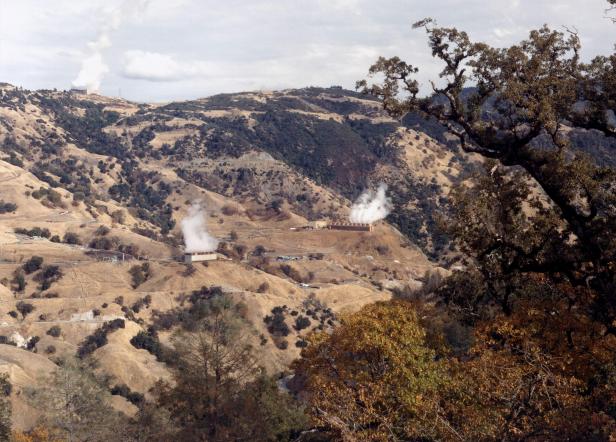 photo credit: US DoE
photo credit: US DoEThe Geysers geothermal field on the Sonoma/Lake
county border.
Headed for the Senate Appropriations Committee this week are two State Assembly bills that could spell out a big win for California geothermal energy projects.
While the proposed legislation is not without opposition, the passage of Assembly Bills 527 and 531 could also mean thousands of new jobs in Mendocino County as power companies eye the region for geothermal.Respectively authored by Assembly Members Diane Papan (D-San Mateo) and Chris Rogers (D-Santa Rosa), AB 527 and 531 would streamline the process to establish projects that would harness renewable energy from heat within the Earth.
The Senate Appropriations Committee will decide Aug. 29 whether to advance the bills.
Specifically, AB 527 would exempt qualifying geothermal test projects from the California Environmental Quality Act, colloquially known as CEQA. AB 531 would expand the types of facilities eligible to be certified as environmental leadership development projects by the California Energy Commission to include geothermal power plants -- effectively fast-tracking the certification process.
"Geothermal energy is uniquely positioned to help California meet its renewable energy goals because it doesn't stop when the sun goes down or the wind stops blowing," Papan stated in a press release.
Geothermal energy is a renewable resource that's harnessed by drilling deep below the Earth's surface to access heat from hot water and steam found above the magma layer. The steam flows to a turbine to drive a generator that in turn produces electricity -- a process that can occur 24 hours a day.
Geof Syphers, CEO of not-for-profit power company Sonoma Clean Power, said California regulations to date have created financial barriers to develop geothermal energy in the state, making California reliant on Utah, Nevada and Colorado, even though the Golden State is ripe with its own natural energy sources.
"California has a permitting process for geothermal that is so risky that developers are saying we're going to go everywhere else first and California last," he said, noting that the state requires a full environmental review that can take anywhere from two to eight years. "You don't even know if you want to invest in building a resource at the end of that, because you have to do the exploration before you can start your next environmental review."
If the state were to pass these bills, Sonoma Clean Power would ramp up its GeoZone project, which would tap into geothermal energy within Mendocino and Sonoma counties. The labor needed to develop up to 600 megawatts of new geothermal energy capacity would require hundreds of white-collar workers and thousands of workers during the construction phase, Syphers said, further noting that the project will create about 1,000 or more permanent jobs.
ENVIRONMENTAL, COST CONCERNS WITH AB 527
While environmental groups like Earth Advocacy, Defenders of Wildlife and the California Native Plant Society have expressed support of geothermal energy as a renewable resource, they've raised concerns about relaxing environmental regulations for power companies.
Kim Delfino, a lobbyist and founder of Earth Advocacy, summarized her three issues with AB 527 to center around 1) the impact of temporary roads and electrical lines through rivers and riparian areas, 2) fracking technology risks, and 3) the size of "undisturbed" land allowed under the CEQA exemption. Delfino noted that 12 acres for CEQA exemption, as written in the legislation, is too large since geothermal exploratory projects in California typically average 5 acres, and the term "undisturbed" is unclear.
Delfino called the claim that environmental review was what's stopping geothermal in the state a red herring. She noted that there are quite a few projects that have already moved forward without lengthy review periods and pointed to another reason some companies are unable to move forward.
"The reason why geothermal has been difficult to develop in the state of California is because the process of creating geothermal energy is more expensive than natural gas or wind and solar, and so they've had a hard time competing on the cost," Delfino said.
She went on to say that a Texas-based energy company called Fervo Energy is driving the legislation, as its leaders have refused to come to California if they can't get CEQA exemption and are not receptive to proposed environmental safeguards. Fervo has developed a new fracking technology for geothermal energy that Delfino said was too new to bypass environmental review.
"Regulations for fracking for geothermal haven't been updated since the 1970s," she said. "Our state agency that regulates this -- (California Geologic Energy Management Division) -- they're not prepared for this new technology coming in."
Fervo did not respond to requests for comment.
During a July 2 Senate Environmental Quality Committee hearing, Matthew Baker, a policy director for environmental advocacy group Planning Conservation League, also expressed support for geothermal energy but backed Delfino's calls for further amendments to AB 527.
"Unfortunately, as we've educated ourselves on the technologies involved and the processes involved here, our concerns have grown rather than narrowed," Baker said. "These are very big projects with intrusive processes and technologies involved. And we still have concerns."
Miles Horton, Sonoma Clean Power external affairs manager, countered, saying fracking for oil and gas differs significantly from the way it's used for geothermal.
"With fracking for oil and gas, you're sending the water down at a level where it could be interacting with groundwater ... And then while it's down there, you're often using a variety of chemicals to scour the oil and gas out of the rock," Horton said. "With enhanced geothermal, you're sending the water down and bringing it back up in a steel lined pipe. So it should not be interacting with groundwater at all."
He pointed to a report by the U.S. Department of Energy called "Pathways to Commercial Liftoff: Next-Generation Geothermal Power" that found geothermal energy had few negative environmental impacts in terms of emissions and water use.
Delfino said that while the geothermal fracking process is contained, "the reality is you're still shooting fracking chemicals into the ground."
"The other issue is that because they're using these incredibly long pipes, you potentially could be impacting water sources and dropping the water table," she said. "We would like to see the determination that there will not be impacts to water quality with the use of this technology or fluids."
Some financial concerns have also arisen. During an initial review of both bills by the Appropriations Committee last week, Christian Beltran, California Department of Finance legislative director, noted his department's opposition to AB 527 because it has costs not included in the 2025 Budget Act. These costs were roughly $3.7 million in the first year, including $3.3 million for infrastructure development.
Overall, Delfino wants to come to a solution that would allow geothermal to move forward, but with amendments that would limit CEQA exemption to five acres and install other protections for water and riparian corridors.
When asked how companies will ensure environmental safeguards remain strong even with streamlined permitting, Horton said AB 527 goes further than the federal policy initiated by former President Joe Biden last year by demanding that a geothermal exploration project meet "the absolute gold standard of environmental stewardship and labor protections in order to receive the exemption from CEQA."
"The project itself -- the phase that comes after exploration -- would still be subject to the normal environmental review process," he added.
Both pieces of legislation will be debated in full this Friday, Aug. 29, before the Committee decides whether they will move forward.
Both Horton and Syphers said the legislation is critical to eliminating the state's dependence on fossil fuels, which currently cover the energy gap when the wind isn't blowing and the sun isn't shining.
"More broadly, we believe that California needs to build geothermal power on a large scale if we are going to meet our ambitious climate and clean energy goals," Horton said. "These two pieces of legislation are about allowing our state to do that on the necessary timelines and giving us a fighting chance at a livable future."

 Live Radio
Live Radio